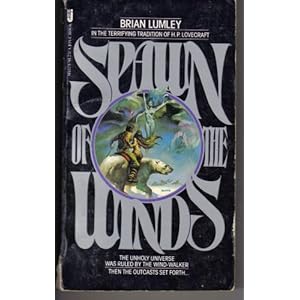by Bill Lindblad
THE DAIN CURSE by Dashiell Hammett (1929)
Call it antihorror.
This is a mystery story involving, among other things, multiple gruesome murders, a ghost, a cult, and a supernatural curse. Under any normal circumstance, a pulp author would have played up those aspects in an effort to lend an air of weird menace to the story. In Hammett's hands, however, the trappings are wasted. The detective in charge of the case does not believe in the supernatural, and it comes across as authoritative even through casual conversation. Even at a point where the detective, attempting to brawl with the ghost and failing, questions his own skepticism the reader is never encouraged to do so because of the way the story is written.
This is not merely a case of horror tropes being poorly handled. It is a situation where those tropes are handled perfectly for a story that is not intended to be horror. Dashiell Hammett's Continental Op serves as the progenitor for Joe Friday on Dragnet while simultaneously channeling Hercule Poirot. He is all business, while simultaneously capable of brilliant and intuitive deductions.
The story is cohesive and reasonable, while still managing to surprise the reader at many turns. It remains in print after more than eighty years, despite some of the conversations and grammatical choices aging poorly, because of how brilliantly constructed the mystery is. It is amazing that something so expertly crafted, steeped in the supernatural and death, could bypass any and all emotions of horror. But it does.
As a horror novel: one star out of five
As a non-horror novel: five stars out of five
SKULL-FACE by Robert E. Howard (1978)
Skull-Face and Others is one of the legendary titles of Arkham House, but the 1978 Berkley edition of Skull-face is the first book to assemble the various related Howard "evil mastermind" works together.
The book begins with an introduction by Richard Lupoff, providing a background on not merely Skull-Face but also the various related stories. He explains the similarity in tone between these stories and the Fu Manchu stories of Sax Rohmer. He also provides an explanation for the connections between the novellas in the book and is the author who completed the final work in the collection, Taverel Manor.
Scholarly introduction aside, the book contains four short novels by Robert E. Howard. They provide his entries into the mad genius subgenre of pulp fiction, although they maintained their distinctive Howard flair even as he emulated the successful formula honed by the Fu Manchu stories.
Howard was unwilling to relegate his protagonists to the role of throwaway hero. While most Rohmer clones made their leads into everyman and focused on the villain, Howard makes his characters distinctive. A hero may be abnormally strong, for example, or be crossed by an unusually gifted woman. The stories aren't as groundbreaking as Rohmer's, but they're a dozen times better than most other imitators.
Four stars out of five.
SPAWN OF THE WINDS by Brian Lumley (1978)
Brian Lumley has been roundly criticized in some circles for deviating far astray from Lovecraft's source material when writing his Mythos fiction. This is for a good reason; Lumley's Mythos work bears more resemblance to action thrillers than it does classic Lovecraftean stories.
Personally, I don't see the problem. Yes, much of the effect of incomprehensible horror is lost when the Mythos gods (here reduced to a simple acronym, like the KGB... the CCD, Cthulhu Cycle Dieties) are presented as anti-humanity monsters instead of creatures whose motivations and views are beyond our understanding. But the stories themselves are consistently strong supernatural thrillers.
Lumley's protagonists are action heroes of the best sort. They're strong, they're intelligent, but they're not infallible and they can be emotionally vulnerable. The women in the stories are usually equally strong. These are not the tense academics of traditional Lovecraftean lore, nor are they Doc Savage, but by incorporating the Mythos so heavily they have resulted in disappointment and vilification from those who demand fealty to the established story principles in their Lovecraftean work. They don't need the same storylines, or so they claim; but if someone is going to lay claim to the beings of Lovecraft he should work to ensure that the beings his action heroes encounter are representative of the cosmic horrors and not watered down versions who work within the traditional human understanding of good and evil.
I appreciate that argument. I also appreciate the best action-fantasy treatment of the Mythos since Conan killed a shoggoth. These are entertaining books with both horror and fantasy elements, and this one, Spawn of the Winds, may be the most blatant example of both sides of the argument. It could be summed up as: "A rough-and-tumble adventurer from Earth fights Ithaqua, the Wind Walker - with only a barbarian princess and her army to help!"
It delivers on what you'd want from such a book, and if that is a warning or promise depends entirely upon your point of view.
Four stars out of five
--Bill Lindblad



